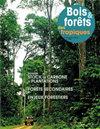橡胶树人工林的风安全:倾斜立木弯曲试验的方法学分析
IF 0.6
4区 农林科学
Q3 FORESTRY
引用次数: 0
摘要
由于橡胶树有能力生产用于工业用途的乳胶,因此橡胶树在大型种植园中密集种植。乳胶是通过从树皮上流血来收获的,这为树木产生了碳汇,损害了它的二次生长,从而削弱了树干的机械阻力。为了研究橡胶树无性系对风破坏的敏感性,我们提出了一个完整的力学模型,揭示了不同形态和力学参数对橡胶树树干抗强风的影响。该模型需要实验数据,这些数据可以从树木的结构描述和种植园现场进行的非破坏性弯曲试验中记录下来。结果提供了所需参数的列表,并指出了它们对估计橡胶树的机械行为的相对重要性,以便为育种目的比较无性系。本文章由计算机程序翻译,如有差异,请以英文原文为准。
Wind safety of rubber trees in plantations: methodological analysis of bending experiments on inclined standing trees
Because of their ability to produce latex for industrial applications, rubber trees are grown intensively in large plantations. Latex is harvested by bleeding off the bark, generating a carbon sink for the tree that impairs its secondary growth and consequently weakens the mechanical resistance of the trunk. In order to study the sensitivity of rubber tree clones to wind breakage, we propose a complete mechanical model that sheds light on the different morphological and mechanical parameters involved in trunk resistance to strong wind events. The model requires experimental data that can be recorded from the structural description of a tree and from non-destructive bending tests performed in situ in plantations. The results provide the list of required parameters and indicate their relative importance for estimating the mechanical behaviour of rubber trees, with a view to comparing clones for breeding purposes.
求助全文
通过发布文献求助,成功后即可免费获取论文全文。
去求助
来源期刊

Bois et Forets Des Tropiques
FORESTRY-
CiteScore
1.50
自引率
16.70%
发文量
31
审稿时长
>12 weeks
期刊介绍:
In 1947, the former Tropical Forest Technical Centre (CTFT), now part of CIRAD, created the journal Bois et Forêts des Tropiques. Since then, it has disseminated knowledge and research results on forests in intertropical and Mediterranean regions to more than sixty countries. The articles, peer evaluated and reviewed, are short, synthetic and accessible to researchers, engineers, technicians, students and decision-makers. They present original, innovative research results, inventions or discoveries. The journal publishes in an international dimension. The topics covered are of general interest and are aimed at an informed international audience.
 求助内容:
求助内容: 应助结果提醒方式:
应助结果提醒方式:


